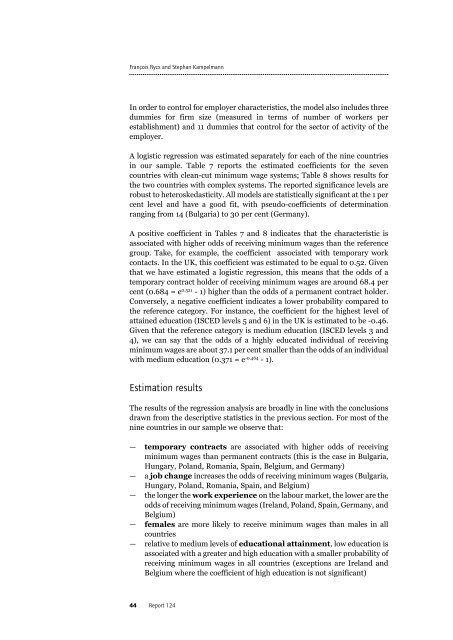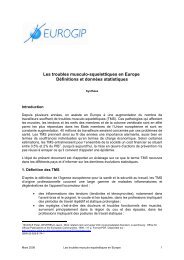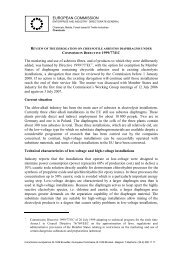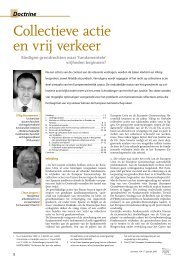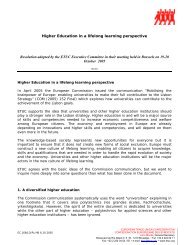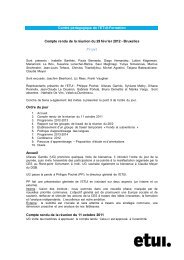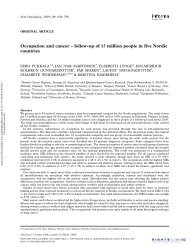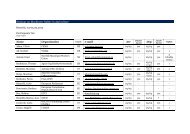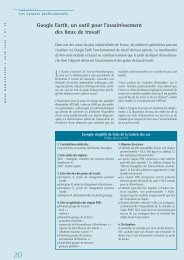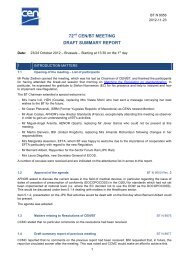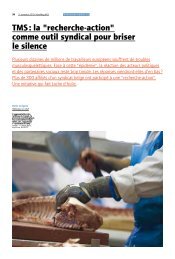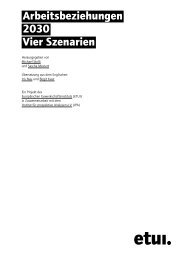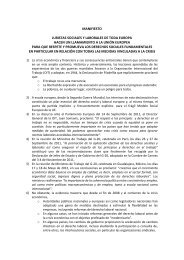Who earns minimum wages in Europe - European Trade Union ...
Who earns minimum wages in Europe - European Trade Union ...
Who earns minimum wages in Europe - European Trade Union ...
You also want an ePaper? Increase the reach of your titles
YUMPU automatically turns print PDFs into web optimized ePapers that Google loves.
François Rycx and Stephan Kampelmann<br />
In order to control for employer characteristics, the model also <strong>in</strong>cludes three<br />
dummies for firm size (measured <strong>in</strong> terms of number of workers per<br />
establishment) and 11 dummies that control for the sector of activity of the<br />
employer.<br />
A logistic regression was estimated separately for each of the n<strong>in</strong>e countries<br />
<strong>in</strong> our sample. Table 7 reports the estimated coefficients for the seven<br />
countries with clean-cut <strong>m<strong>in</strong>imum</strong> wage systems; Table 8 shows results for<br />
the two countries with complex systems. The reported significance levels are<br />
robust to heteroskedasticity. All models are statistically significant at the 1 per<br />
cent level and have a good fit, with pseudo-coefficients of determ<strong>in</strong>ation<br />
rang<strong>in</strong>g from 14 (Bulgaria) to 30 per cent (Germany).<br />
A positive coefficient <strong>in</strong> Tables 7 and 8 <strong>in</strong>dicates that the characteristic is<br />
associated with higher odds of receiv<strong>in</strong>g <strong>m<strong>in</strong>imum</strong> <strong>wages</strong> than the reference<br />
group. Take, for example, the coefficient associated with temporary work<br />
contacts. In the UK, this coefficient was estimated to be equal to 0.52. Given<br />
that we have estimated a logistic regression, this means that the odds of a<br />
temporary contract holder of receiv<strong>in</strong>g <strong>m<strong>in</strong>imum</strong> <strong>wages</strong> are around 68.4 per<br />
cent (0.684 = e 0.521 - 1) higher than the odds of a permanent contract holder.<br />
Conversely, a negative coefficient <strong>in</strong>dicates a lower probability compared to<br />
the reference category. For <strong>in</strong>stance, the coefficient for the highest level of<br />
atta<strong>in</strong>ed education (ISCED levels 5 and 6) <strong>in</strong> the UK is estimated to be -0.46.<br />
Given that the reference category is medium education (ISCED levels 3 and<br />
4), we can say that the odds of a highly educated <strong>in</strong>dividual of receiv<strong>in</strong>g<br />
<strong>m<strong>in</strong>imum</strong> <strong>wages</strong> are about 37.1 per cent smaller than the odds of an <strong>in</strong>dividual<br />
with medium education (0.371 = e -0.464 - 1).<br />
Estimation results<br />
The results of the regression analysis are broadly <strong>in</strong> l<strong>in</strong>e with the conclusions<br />
drawn from the descriptive statistics <strong>in</strong> the previous section. For most of the<br />
n<strong>in</strong>e countries <strong>in</strong> our sample we observe that:<br />
— temporary contracts are associated with higher odds of receiv<strong>in</strong>g<br />
<strong>m<strong>in</strong>imum</strong> <strong>wages</strong> than permanent contracts (this is the case <strong>in</strong> Bulgaria,<br />
Hungary, Poland, Romania, Spa<strong>in</strong>, Belgium, and Germany)<br />
— a job change <strong>in</strong>creases the odds of receiv<strong>in</strong>g <strong>m<strong>in</strong>imum</strong> <strong>wages</strong> (Bulgaria,<br />
Hungary, Poland, Romania, Spa<strong>in</strong>, and Belgium)<br />
— the longer the work experience on the labour market, the lower are the<br />
odds of receiv<strong>in</strong>g <strong>m<strong>in</strong>imum</strong> <strong>wages</strong> (Ireland, Poland, Spa<strong>in</strong>, Germany, and<br />
Belgium)<br />
— females are more likely to receive <strong>m<strong>in</strong>imum</strong> <strong>wages</strong> than males <strong>in</strong> all<br />
countries<br />
— relative to medium levels of educational atta<strong>in</strong>ment, low education is<br />
associated with a greater and high education with a smaller probability of<br />
receiv<strong>in</strong>g <strong>m<strong>in</strong>imum</strong> <strong>wages</strong> <strong>in</strong> all countries (exceptions are Ireland and<br />
Belgium where the coefficient of high education is not significant)<br />
44 Report 124


